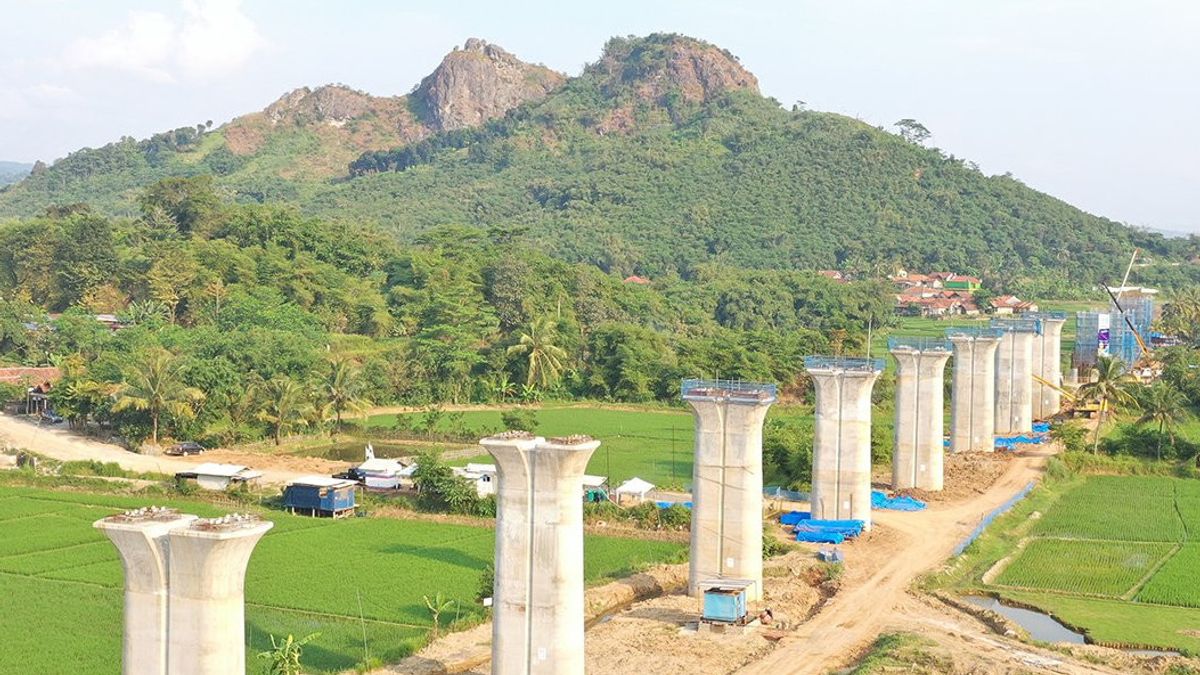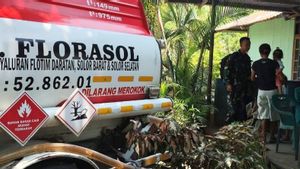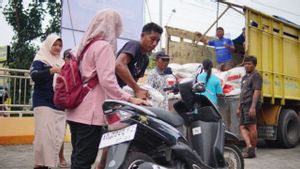JAKARTA - University of Indonesia (UI) senior economist Faisal Basri criticized a number of transportation infrastructure projects built by the government. According to Faisal, these infrastructure projects are a waste. The projects in question are airports, ports and high-speed trains.
Faisal said the infrastructure projects were considered redundant because they would not be profitable but the investment was very large. Therefore, he considered, the current government is very wasteful, it can even lead to state bankruptcy.
"The project was built that is not chaotic," he said in a virtual discussion, Wednesday, October 13.
The first project in the spotlight is Kertajati Airport. As is known, the government will make Kertajati airport in Majalengka, West Java, an aircraft maintenance, repair, overhaul or MRO area aka aircraft repair shop. Later, the facility will be open to aircraft from government agencies, the TNI and Polri, as well as the private sector.
Kertajati Airport is suitable as a livestock warehousePreviously, the plan for Kertajati Airport to become an aircraft repair shop, this airport had seized the public's attention. Because, Kertajati Airport was built with a high investment value, which reached Rp. 2.6 trillion.
This fund disbursement is to support the construction of an airport which has a runway of 3,000 meters with a passenger capacity of 29 million people.
In terms of area, Kertajati Airport is the second largest airport in Indonesia after Soekarno Hatta International Airport. Unfortunately, once the airport was finished, the conditions were deserted. In January-September 2020, for example, the number of passengers was only 42,400 people, down 82 percent from 243,756 people in the same period the previous year.
As for the realization, it is far from burning with a target of around 2.7 million passengers when it is already operating. The number is also not comparable to other airports.
Therefore, Faisal considered the Kertajati Airport project to be a waste of budget. The government, according to him, has been wasteful. Faisal believes that the airport is better off being converted into a livestock warehouse.
"Kertajati Airport is better off perhaps as a livestock warehouse," he said.
Not only Kertajati Airport, Faisal assessed, projects that also include waste is the construction of the Light Rail Transit (LRT) Palembang. Then, the next project that is also in the spotlight is the Kuala Tanjung Port, in North Sumatra.
Faisal said the reason was because the port was too close to the Belawan port, which is also in North Sumatra. So according to him, unhealthy competition arises.
Therefore, the Ministry of Transportation has decided that Kuala Tanjung Port will become international law in 2019. Meanwhile, Belawan Port will serve domestic services. This decision was taken as a solution to overcome the location of the two adjacent ports.
The Jakarta-Bandung high-speed train will not return the investmentFaisal also highlighted the construction of the Jakarta-Bandung High Speed Train (KCJB). As is known, the project was built by PT Kereta Api Indonesia-China or KCIC. This project has been in the spotlight because the government has injected funds into the project through the use of the state revenue and expenditure budget (APBN).
The green light for the use of the state budget is because the project financing has swollen to 8 billion US dollars. Initially, this project was calculated to cost 6.07 billion US dollars through the cooperation of the Indonesian and Chinese governments.
The use of the APBN for the Jakarta-Bandung high-speed rail project is revealed in Presidential Regulation (Perpres) No. 93/2021, which was just signed on October 6, 2021. The regulation is an amendment to Presidential Decree No. 107/2015, concerning the Acceleration of the Implementation of Infrastructure and Facilities for the Jakarta-Bandung high-speed train. .
The assistance is provided in the form of state capital grants (PMN), project guarantees, and permits to issue debt securities or bonds for PT Kereta Api Indonesia (Persero) or KAI as the project consortium leader.
"The high-speed train project, which was previously business to business, will soon be injected using the state budget," he said.
Furthermore, Faisal also mentioned that soon it will be the people who will finance the project.
"Soon people will pay for the fast train, which may cost Rp. 400 thousand one way and it is estimated that until the end of the world there will be no return on investment," he said.
Therefore, Faisal considered that the state spent 50 percent more capital expenditure to produce the same thing than the previous government. In fact, investment in Indonesia's infrastructure is the highest among ASEAN countries.
"So, in my opinion, the conclusion is that the top leadership has made a mistake," he explained.
For your information, this fast train is a mode of mass transportation that operates from the Jakarta area to Bandung and vice versa. This fast train uses the latest generation CR400AF with an operating range of 142.3 km. This transportation goes through four stops, namely Halim, Karawang, Walini, and Tegalluar.
Quoted from kcic.co.id, there are several advantages that the Jakarta-Bandung High Speed Train has, which is more effective and efficient, especially in terms of time. Then, the technology used in this transportation is modern. Then, the government also guarantees the safety of this transportation. Especially for passengers with disabilities to stay comfortable during the trip.
Not only that, another advantage is that this fast train will be integrated with other public transportation modes such as LRT and Transjakarta. It is even planned that there will be Bus Rapid Transit (BRT) at every stop station.
Minister of Transportation (Menhub) Budi Karya Sumadi said that the construction project of the Jakarta-Bandung High-Speed Train that uses high technology is a good leap for Indonesia.
This statement was made by Budi at the opening ceremony of the head office of China Railway Group Limited (CREC) in Indonesia, which is the largest investor in the Jakarta-Bandung high-speed rail project.
"This is a certain leap for Indonesia in terms of development technology, from what was previously not possible, now it is possible. We should interpret this leap well," Budi Karya was quoted as saying in a written statement, Sunday, April 11.
The English, Chinese, Japanese, Arabic, and French versions are automatically generated by the AI. So there may still be inaccuracies in translating, please always see Indonesian as our main language. (system supported by DigitalSiber.id)













